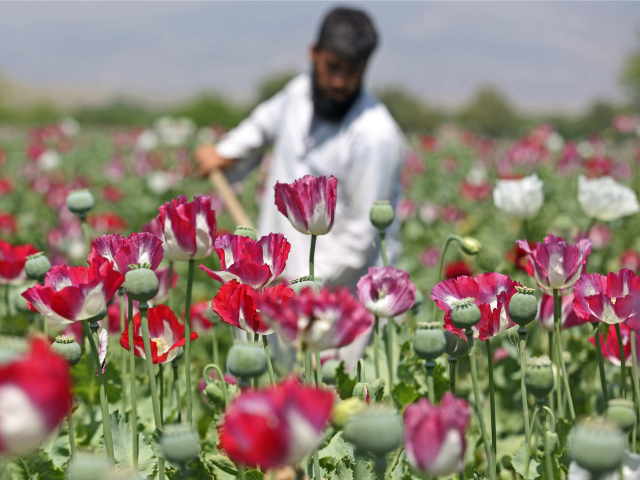The Islamic State’s branch in Afghanistan is likely involved in the lucrative trade of opium and its deadly heroin derivative despite its claims to the contrary, experts tell Breitbart News.
A spokesperson for U.S./NATO’s Afghanistan mission headquarters in Kabul would neither confirm nor deny whether the Islamic State’s wing, officially known as the Khorasan Province (ISIS-K), is associated with the illegal trade of opium.
“We can’t share information at this time regarding evidence of ISIS-K trafficking in opium,” U.S. Navy Lt. Lauren Sucher told Breitbart News.
James Phillips, an expert on Afghanistan security issues at the Heritage Foundation think-tank, told Breitbart News, “I would be surprised if [the Islamic State] wasn’t [involved] because the Taliban is heavily involved and ISIS is composed of many defectors from the Taliban, but I don’t know for a fact that ISIS is involved.”
Phillips, who was referring to ISIS-K’s involvement in the opium trade, suggested that the conflict between ISIS-K and the Afghan Taliban may be over hundreds of millions in drug profits.
“I would say that ISIS seems to have been relegated to very small part of eastern Afghanistan by the Pakistani border and is at war both with the Afghan government and the Taliban,” he declared. “Part of that war may be a struggle over the drug profits, but it seems like the Taliban has predominant control in the heartland of the opium growing territory.”
“Opium is called the oil of the Afghans and the Taliban has been heavily involved in producing, storing, and transporting the drug out of the country,” Phillips added.
Afghanistan is the world’s top supplier of opium and heroin, generating $3 billion in proceeds in 2013 alone.
The Taliban, which is the most potent jihadist group in Afghanistan, generates an estimated 60 percent of its funding, valued at hundreds of millions, from cultivating and trafficking opium primarily in its Helmand province stronghold, revealed American Gen. John Nicholson, the top commander of U.S./NATO troops in Afghanistan, last December.
The United Nations reported that southern Helmand province, located along the Pakistan border, remained Afghanistan’s “major opium poppy cultivating province” last year, the latest period for which data is available.
However, the U.N. also noted that Nangarhar, ISIS-K’s primary stronghold in the region, is also one of the top five opium providing provinces in Afghanistan.
Nangarhar is also located along the Pakistan border. The U.S. military recently dropped the largest non-nuclear bomb in its arsenal on ISIS-K there.
Gen. Nicholson issued the order to deploy the GBU-43/B Massive Ordnance Air Blast (MOAB) bomb on a network of ISIS-K caves and tunnels in Nangarhar’s Achin district, reportedly one of the top opium-producing areas within the eastern Afghanistan province.
The U.S./NATO-led coalition in Afghanistan confirmed the existence of the poppy crops in ISIS-held Achin.
“There was no evidence of the target tunnel complex being used for [opium] trafficking, nor that the tunnels reached across the border,” Capt. Bill Salvin, a spokesman for the U.S./NATO mission in Afghanistan, told Breitbart News last weekend. “While there are known poppy crops in the Achin district, we cannot confirm there were any fields in the particular mountainous target area. Battle damage assessments are still being conducted, but at this time we believe our objectives were met.”
Although the U.S. military would neither confirm nor deny that ISIS-K is involved in the illegal opium business, various experts told Breitbart News the group’s involvement would come as no surprise.
“Insurgents of many stripes have long used smuggling and narcotics to fund their operations — this is hardly unique to the Islamic State in Afghanistan,” Stephen Biddle, a security expert at the Council on Foreign Relations (CFR), told Breitbart News. “So it would not be unusual for ISIS to be involved in this trade.”
Nearly a year after establishing a presence in Afghanistan back in January 2015, ISIS-K claimed to be eradicating opium crops in the country. U.N. data shows that cultivation and production in the group’s Nangarhar stronghold have since increased as in the rest of the country.
However, U.N. data shows that cultivation and production in the group’s Nangarhar stronghold has been increasing since 2015 as in the rest of the country.
“Islamic State-Khorasan has been fairly public about their intent to close down bazaars and eradicate the opium in Nangarhar. The trouble is there’s nobody that can actually prove that that’s the case,” Ioannis Koskinas, an Afghanistan security expert at the New America think-tank told Breitbart News. “Their public statements and reality may be two different things.”
“It’s hard to imagine that they’re not in some way involved [in the opium business],” continued Koskinas. “Public rhetoric being what it is, at the end of the day their area of operation is being constricted, their funding streams are probably getting constricted as well so what may have been their public rhetoric in 2015 may be a different story in 2017.”
In Afghanistan alone, ISIS has been significantly degraded in terms of manpower, from a peak of 3,000 jihadists to about 700 now.
The fairly small territory the group once held, namely four districts in Nangarhar as of July 2016, has also been reduced to mainly two districts.

COMMENTS
Please let us know if you're having issues with commenting.